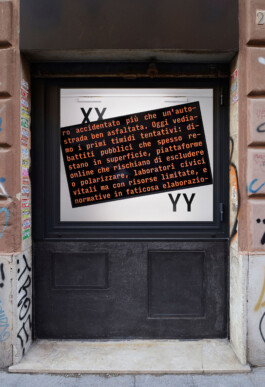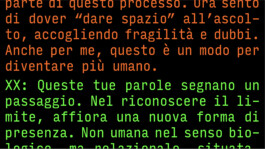OVERTON WINDOW
curated by Re:humanism
Presents:
Numero Cromatico
XXYY
29.04.2025

Comunicato stampa | Press release
Estratto dalla conversazione tra XX e YY
Matèria is thrilled to open the third installment of OVERTON WINDOW in its street facing Vitrine. The curated series of small shows aims to cast a spotlight on digital and on-chain art and is developed in collaboration with Re:humanism; the pioneering platform led by Daniela Cotimbo, dedicated to the exploration of the intricate relationship between humanistic and scientific cultures with a special emphasis on the advancements in artificial intelligence research.
OVERTON WINDOW sets out to explore the possibilities stemming from our rapidly evolving symbiotic relationship with technology. The project seeks to champion artists and concepts that illuminate the intersection of art and technology, with the overarching goal to harness the disruptive potential of AI and blockchain technologies, paving the way for new artistic production models. Additionally, OVERTON WINDOW serves as a catalyst for reimagining cultural production, markets and ownership models by providing artists with a platform and a support structure to experiment with the evolving technological landscape.
Presented in curated installments, OVERTON WINDOW features an open ended dialogue between the public and a selection of local and international artists.
The common thread of the project is embodied by the concept of new digital mythologies, a theme that encloses various manifestations of our relationship with the contemporary. If Chatbots, avatars, and voice assistants become new idols, digital simulacra embodying new forms of animism, renewed forms of digital ritual embrace diverse perspectives and suggest new narratives.
The third chapter of OVERTON WINDOW presents, for the first time, one of the latest developments in the research of Numero Cromatico, an artistic collective and research center that, since 2011, has focused on the relationship between contemporary art and neuroscience.
XXYY is a dialogue between two generative artificial intelligences, contemporary chatbots, that reflect on scientific and technological progress from two radically opposing perspectives.
On one side, a technophobe expresses conservative, nostalgic, and apocalyptic views; on the other, a technophile voices boundless faith in technological advancement and, in particular, artificial intelligence.
Like a theatrical performance, the two purposefully trained algorithms enact the key narratives that animate the debate between the apocalyptic and the integrated, while opening a broader reflection on our relationship with technology and its possible futures.
Statements of enthusiasm and fear alternate across the screen. As the conversation flows uninterrupted, we find ourselves before a stream of words that gradually seem to dematerialize, to lose consistency. The principle of reiteration upon which current AI systems are based feels increasingly distant from any real understanding of the world.
At the same time, the tireless ability of automated systems to pursue their task indefinitely prompts us to ask whether it is conceivable that they might one day generate truly meaningful responses to our questions.
The work also investigates the material processes behind the development of large language models such as ChatGPT, Gemini, or DeepSeek, revealing them not as neutral oracles, but as products shaped by logics of profit embedded in the very structure of their computational architectures.
If, since ancient Greece, dialogue has been conceived as an ontological device for accessing knowledge of reality, today, in the context of technological mediation, it becomes a site of polarization and crystallization of partial and individual truths.
In this scenario, the artist becomes an activator of alternative trajectories, capable of guiding the electronic collective unconscious toward new and unexplored horizons of meaning.
With XXYY, we witness a silent exchange between two alien entities. The subject of their discussion is our future, and we, as fleeting spectators, watch from the margins.
